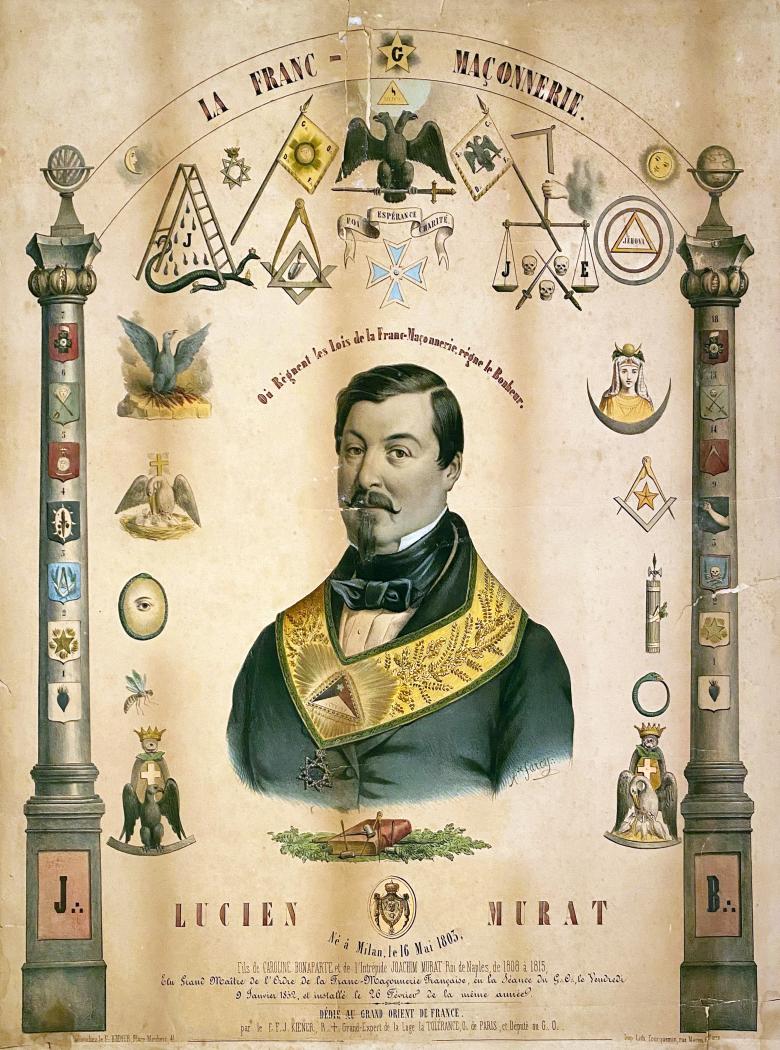Masonic portrait of Lucien Murat


Some of our latest news
Masonic portrait of Lucien Murat
This week's object is a Masonic portrait of Lucien Murat (1803-1878), whose birthday falls on May 16. He is a famous French politician from the family of Napoleon.
Lucien Murat was born in Naples and was a nephew of Napoleon Bonaparte. His mother, Caroline Bonaparte, was Napoleon's sister and his father, Joachim Murat, was one of Napoleon's closest associates and a military leader.
Lucien Murat's family was very closely associated with Freemasonry. It is known that his illustrious father was initiated into Freemasonry in the Milan lodge "L'Heureuse Rencontre" (Happy Meeting) in 1801, and was also a member of the "Napoleon" lodge in Paris. In 1805, Joachim Murat became Assistant Grand Master of the Grand Orient of France, as well as Grand Warden. In 1809, he became the founder and Grand Master of the Grand Order of Naples.
It is not known whether Napoleon himself was a Freemason, but his political reforms were in line with Masonic principles. It was Napoleon who abolished the radical reforms of the French Revolution, reconciled Catholicism with the revolutionary forces, stopped the persecution of the priesthood and created a dialogue between the opposing forces. He also promoted the abolition of serfdom, emancipated and integrated the Jews, and reinforced the ideas of classical liberalism and the inviolability of private property, thus rejecting revolutionary radicalism.
However, Lucien Murat's other uncle and Napoleon's older brother, Joseph Bonaparte, was Grand Master of the Grand Orient of France (1804-1806) and founder of the Grand National Lodge of Spain (1809). Like Napoleon, Joseph Bonaparte was politically moderate and promoted a dialogue between secular and religious authorities.
Thus, Lucien Murat was already growing up with a worldview rooted in Masonic philosophy. He was born in Naples, educated in Austria, but also spent a big part of his life in the United States, Spain and France. According to sources, Murat was initiated in Freemasonry in Austria as early as 1821. However, his Masonic activities reached their peak in the mid-19th century, specifically between 1852 and 1862, when Murat was Grand Master of the Grand Orient of France.
One of Murat's first projects was the construction of the Grand Orient of France temple building in Paris in 1853, which still stands today and houses the Museum of French Freemasonry. Murat also reinforced the need for belief in God and the immortality of the soul, thus creating a rift with the more secular wing of Freemasonry, which allowed atheism and discussion of politics. According to his own views, Lucien Murat was closer to modern regular Freemasonry. It is also known that Murat was acquainted with another famous Freemason, Giuseppe Garibaldi. Their joint meeting probably took place in 1859, and it is known that, like Garibaldi, Murat shared with him the idea of the unification of Italy, which was finally achieved in 1871.
Thus, Lucien Murat can be considered a controversial figure for his time. Among other things, he was accused of a more conservative understanding of Freemasonry and close ties to the Bonaparte dynasty. However, one cannot deny Murat's contribution to Freemasonry and the consolidation of the Grand Orient, which prior to his becoming a Grand Master was in a chaotic state, tormented by wars and revolutions. Objectively assessing Murat's activities, it can be safely said that he adhered to the main Masonic principles of a tolerant society.
 Museum
Museum